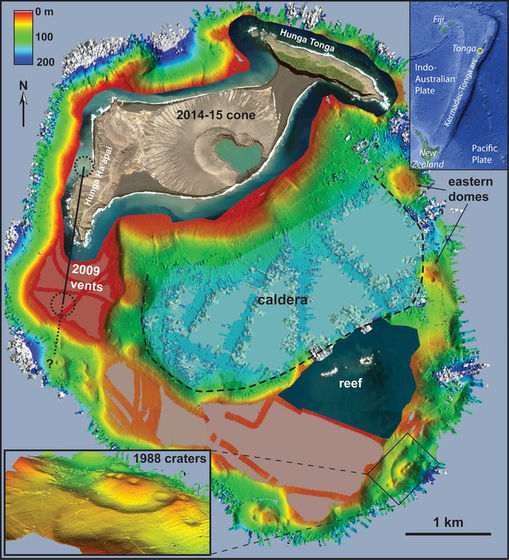Volcanologists explain why the volcanic eruption in Tonga is so fierce and a sign of a major eruption in the future

Why the volcanic eruption in Tonga was so violent, and what to expect next
https://theconversation.com/why-the-volcanic-eruption-in-tonga-was-so-violent-and-what-to-expect-next-175035
The Hunga Tonga-Hunga Haapai volcano that erupted this time is a submarine volcano located between Hunga Tonga Island and Hunga Haapai Island, 65 km north of Nuku'alofa, the capital of the Kingdom of Tonga. Although it is only about 100m above sea level, it is a huge volcano with a height of about 1.8km from the sea bottom and a width of about 20km, so in this eruption, shock waves spread widely from meteorological satellites floating in space and the atmospheric pressure in the vicinity is temporary. It was clearly recorded that the sky soared.
High-resolution Himawari satellite imagery of the #HungaTongaHungaHaapai volcanic eruption in Tonga ????
— NIWA Weather (@NiwaWeather) January 15, 2022
Our climate stations recorded a brief spike in air pressure as the atmospheric shock wave pulsed across New Zealand. Pic.twitter.com/BfLzdq6i57
According to professor Shane Kronin, a volcano who teaches geosciences at the University of Auckland in New Zealand, Hunga Tonga-Hunga Ha'apai is a volcano that erupts regularly and has been erupting since 2009 and 2014. It is said that it has erupted twice in 2015. However, the scale of this eruption is far larger than the previous one and the one before the previous one.
In the case of submarine volcanoes, even if magma rises from underground, it is cooled by seawater, so it seems that a large explosion will not occur. In fact, in the case where magma is slowly released into seawater, a film of water vapor is formed between the magma and water and acts as a heat insulating material, so even magma with a temperature of 1200 degrees will slowly cool down.
However, when magma spouts vigorously from the ground filled with volcanic gas, the film of water vapor is immediately destroyed, so the hot magma and water come into direct contact with each other, causing a steam explosion , and the impact crushes the surface of the magma. The hot magma is further released into the water. Volcano researchers ' fuel-coolant interactions result of explosion by this phenomenon, which is referred to as a' took place a chain reaction, ultimately like to be large explosion and the supersonic speed of the blast, such as a large bomb occurs Become.
In the last eruption between 2014 and 2015, the newly generated crater and the old island merged into one island, creating a large caldera on the seafloor.

by Shane Cronin
A caldera is a crater-like basin formed by a large-scale eruption where magma collapses inside the crater, and a small eruption may occur at the trailing edge, but the caldera itself may erupt again. Then, as a result of Professor Kronin's visit to the site in 2016 and dating of sediments on the seafloor, the volcano of Tonga repeated large eruptions every 1000 years, and the last eruption was around 1100. I understand. In other words, the small eruptions that occurred in 2009 and 2014 are only precursors to a large eruption, and this time it is possible that this will be a large eruption once in 1000 years.
Professor Kronin notes that this eruption generated a 20km high and 260km diameter eruption. This means that the sleeping caldera may wake up again and spew out large amounts of volcanic gas and magma. In addition, waves and tide level changes have been observed in various places such as Tonga, Fiji, and Samoa in this eruption, but it is possible that this is also due to the collapse of the caldera and the seafloor landslide.
Based on these findings, Professor Kronin said, 'I don't know if this eruption is a climax. There is no doubt that the pressure of the magma has been greatly released, so this may calm the volcano. It warns us that the once-in-a-thousand-year caldera eruption caused many explosive eruptions, so this eruption will cause volcanic volcanic periods over the next few weeks to years. It is possible that an unrest) will come. Given the people of Tonga, I hope it doesn't happen. '
Related Posts:
in Science, Posted by log1l_ks







